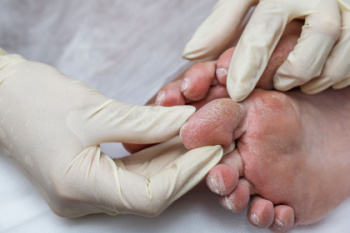 Pressure injuries and diabetic foot wounds are two distinct yet potentially serious conditions that affect the feet, often requiring specialized medical attention from a podiatrist. Pressure injuries, commonly known as bed sores or ulcers, develop due to prolonged pressure on specific areas of the body, typically seen in individuals who are immobile or bedridden. They often occur on bony prominences, such as the heels, ankles, or toes, and lead to tissue damage and open wounds. Diabetic foot wounds are a consequence of diabetes-related complications, including peripheral neuropathy and impaired circulation. These wounds typically appear as ulcers, blisters, or cuts and are slow to heal due to poor blood flow and reduced sensation in the feet. Diagnosing these conditions involves careful examination, often including assessment of wound size, depth, and surrounding tissue condition. Prompt intervention is imperative to prevent complications like infection or tissue necrosis. If you have a foot wound or ulcer, it is strongly suggested that you seek immediate evaluation and treatment from a podiatrist to prevent further complications and promote healing.
Pressure injuries and diabetic foot wounds are two distinct yet potentially serious conditions that affect the feet, often requiring specialized medical attention from a podiatrist. Pressure injuries, commonly known as bed sores or ulcers, develop due to prolonged pressure on specific areas of the body, typically seen in individuals who are immobile or bedridden. They often occur on bony prominences, such as the heels, ankles, or toes, and lead to tissue damage and open wounds. Diabetic foot wounds are a consequence of diabetes-related complications, including peripheral neuropathy and impaired circulation. These wounds typically appear as ulcers, blisters, or cuts and are slow to heal due to poor blood flow and reduced sensation in the feet. Diagnosing these conditions involves careful examination, often including assessment of wound size, depth, and surrounding tissue condition. Prompt intervention is imperative to prevent complications like infection or tissue necrosis. If you have a foot wound or ulcer, it is strongly suggested that you seek immediate evaluation and treatment from a podiatrist to prevent further complications and promote healing.
Wound care is an important part in dealing with diabetes. If you have diabetes and a foot wound or would like more information about wound care for diabetics, consult with Gregory, Gulso, DPM from Gulso Podiatry. Our doctor will assess your condition and provide you with quality foot and ankle treatment.
What Is Wound Care?
Wound care is the practice of taking proper care of a wound. This can range from the smallest to the largest of wounds. While everyone can benefit from proper wound care, it is much more important for diabetics. Diabetics often suffer from poor blood circulation which causes wounds to heal much slower than they would in a non-diabetic.
What Is the Importance of Wound Care?
While it may not seem apparent with small ulcers on the foot, for diabetics, any size ulcer can become infected. Diabetics often also suffer from neuropathy, or nerve loss. This means they might not even feel when they have an ulcer on their foot. If the wound becomes severely infected, amputation may be necessary. Therefore, it is of the upmost importance to properly care for any and all foot wounds.
How to Care for Wounds
The best way to care for foot wounds is to prevent them. For diabetics, this means daily inspections of the feet for any signs of abnormalities or ulcers. It is also recommended to see a podiatrist several times a year for a foot inspection. If you do have an ulcer, run the wound under water to clear dirt from the wound; then apply antibiotic ointment to the wound and cover with a bandage. Bandages should be changed daily and keeping pressure off the wound is smart. It is advised to see a podiatrist, who can keep an eye on it.
If you have any questions, please feel free to contact our office located in Bountiful, UT . We offer the newest diagnostic and treatment technologies for all your foot care needs.
